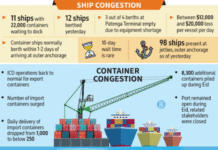The Business Standard 21 June 2020

During the first nine months of FY2019-20, the government’s net borrowing from national savings schemes stood at Tk11,203 crore, which was 94 percent of the revised target for meeting the budget deficit from savings tools.
According to the statement of the Department of National Savings, the gross sale of national savings certificates stood at Tk5,624 crore in March this year.
After paying interests and refunding the principal amount of Tk4,087 crore in that month, the government’s net loan from the fiscal instrument amounted to Tk1,537 crore.
In March last year, net loan from savings certificates was Tk4,130 crore.
Between July and March of the 2019-20 fiscal year, gross sale of savings certificates stood at Tk53,916 crore, and interest payment and refund amounts were Tk42,714 crore.
The government lowered its borrowing target from savings tools to meet the budget deficit in the current fiscal year as it received low response from the sector. A low target has also been set for the upcoming 2020-21 fiscal year.
In FY2019-20, the government had to cut the target to Tk11,924 crore in the revised budget for savings tools. The total target from non-banking sources was reduced to Tk14,924 crore.
The government previously targeted Tk30,000 crore in loans from non-banking sources for the current fiscal year, of which Tk27,000 crore was expected to come from national savings schemes.
For the upcoming fiscal year, Finance Minister AHM Mustafa Kamal has proposed a loan target of Tk25,000 crore from non-banking sources, including Tk20,000 crore from savings instruments.
The finance minister presented his budget proposal for the 2020-21 fiscal year in the parliament on June 11.
Data shows that during July to March of FY2018-19, gross sales of savings certificates stood at Tk68,973 crore and net sales were Tk39,733 crore after paying interest and refunding the principal.
Ahsan H Mansur, executive director of private think tank Policy Research Institute of Bangladesh, told The Business Standard that the government did not get as much loans as it had initially targeted from this sector in the current fiscal year.
From this fiscal year, the government also tightened the process of investing in savings schemes, he added.
From July 1 last year, the government brought four kinds of popular savings schemes under automation, and made e-TIN mandatory for investing in them.
A tax burden for investments of over Tk5 lakh was also put in place. Besides, the investment ceiling was set at Tk50 lakh and Tk1 crore for a person and a pensioner, respectively.
Shamsunnahar Begum, director general of the Department of National Savings, said a committee was trying to include two other schemes – postal term deposits and savings deposits – in the individual investment limit of Tk50 lakh.
Recently, the government reduced the investment limit for postal savings tools to Tk20 lakh from Tk60 lakh.
The profit rate for national savings schemes is still around 11 percent whereas interest rate for bank deposits is 6 percent at maximum.
At the end of March this year, the government’s outstanding loans increased to Tk298,909 crore from Tk277,500 crore during the same month last year.
In the last fiscal year (FY2018-19), the government’s net loan stood at Tk47,946 crore, which was 6.54 percent higher than the revised target of Tk45,000 crore for that fiscal year.









